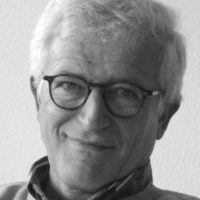Comfort Zones and Conflict Lines: How Germany Cares for Its Religions

Rolf Schieder
Humboldt University
Prof. Rolf Schieder holds the chair of Practical Theology at Humboldt University. He is the speaker of the Program on Religion and Politics. His research is focused on politics of religion, interreligious competences, and religion and economics. He is the author of “Wieviel Religion vertraegt Deutschland?” (2001) and editor of “Religion and Politics in the United States and Germany. Old Divisions and New Frontiers” (2007).
In October 2013, Minister President and leader of the Greens in Baden-Württemberg, Winfried Kretschmann, gave an outline of his understanding of freedom of religion and the relationship between state, churches, and other religious organizations and coined the term “active freedom of religion.” While “positive freedom of religion” guarantees individual and collective free exercise of religion, and “negative freedom of religion” guarantees the right to stay away from any religious practice, the term “active freedom of religion” was supposed to point to the state’s interest in taking “public care of religion” (“öffentliche Religionspflege”) in order to support people in their free exercise of religion.
Freedom of Religion: Positive, Negative, Active
This is an amazing statement. It does not mean that the state should identify with any belief system. The state does not hold any world view, but the state is free to support the religious life of its citizens. A state might do this because it needs citizens whose beliefs motivate them to be active members of society. Kretschmann’s plea for “active freedom of religion” goes as follows: Since the state is not allowed to identify with any religion, but remains neutral toward any world view, it has to rely heavily on the beliefs of its citizens. Should these beliefs erode and should a basic sense for the “meaning of meaning” (“Sinn für den Sinn”) fade away, the concept of “active freedom of religion” would allow the state to support those actors in civil society who provide a sense for the meaning of meaning. Here is the paradox: the more secular a state defines itself, the more it might be obliged to support those societal organizations that provide a sense of meaning against the threat of meaninglessness. The concept of “active freedom of religion” implies that the state will support religious organizations not only when it comes to welfare and social services, but also when it comes to providing a meaningful approach to the meaning of meaning. The active role of the state has to be complemented by an active and co-equal role of the religious communities. Kretschmann called on the religious communities to contribute to society more actively and more attractively.
The German System: Cooperation of Church and State – No Separation
Whoever attempts to study the role of religion in German public life has to be aware that the idea of separation of church and state has never been realized in Germany. A “wall of separation” never existed. Even the socialist East German regime did not destroy the traditional structure of Protestant “Landeskirchen” nor did it close down any of the five state-run and state-paid theological faculties at the universities of Jena, Leipzig, Berlin, Rostock, and Greifswald. State support for the churches has a long and deeply-rooted tradition in Germany. The Reformation would not have been successful without strong political support. Protestants asked their princes to be “summus episkopus,” the highest bishop within their territory. The construct of the rule of princes over the Protestant churches in Germany (“landesherrliches Kirchenregiment”) remained stable until 1918.
The constitution of the Weimar Republic of 1919 stated in article 137: “There is no state church.” But any religious community—as well as any association aiming at supporting a certain world view (“Weltanschauungsgemeinschaft”)—was granted the right to apply for the status of a “corporate body of public law.” This status allowed, for instance, the use of tax lists of the fiscal authorities to calculate the membership fees according to the income of a church member, who must pay 9 percent of his income tax to a church. The revenue offices help the churches to bill their members according to the amount of taxes they pay to the state. This system of financing religious communities is wrongly called a “church tax system.” All citizens do not have to pay “church taxes”; rather, only those citizens who belong to a religious community with the status of a “corporate body of public law” contribute. Tithing and paying church taxes differs only in the way the money is collected: in Germany it is done with the support of the revenue offices.
The German Basic Law of 1949 resumed article 137 of the “Weimarer Verfassung” of 1919. After the staggering experience with the anti-clerical totalitarianism of fascism and Stalinism, leading politicians of the newly founded West German republic were convinced that the churches would be important actors in civil society and should get as much support from the state as possible. This appreciation of the churches is not without irony, as both the Catholic and the Protestant churches in Germany had been quite critical of the idea of universal human rights and democracy at that time. In 1989, however, the churches in the German Democratic Republic (GDR) played a vital and important role for the dissemination of democratic values. Not “separation of church and state,” but “cooperation of church and state” best describes the religio-political landscape in Germany. But the pluralization and the individualization of religion poses new challenges and creates new conflicts.
Individualization and Pluralization of Religion as a Challenge
In 1950 more than 90 percent of the German population belonged either to the Catholic Church or to one of the Protestant “Landeskirchen.” In the West, there were 25.7 million Protestants and 23.2 million Catholics; in the East, 14.8 million Protestants and 2 million Catholics. In 2010, 23.8 million Germans belonged to a Protestant church and 24.6 million to the Catholic one. In absolute numbers membership in the two so-called “Volkskirchen” remained stable. But in comparison with the total population, the picture changes. Only 30.1 percent of Germans belong to the Catholic Church and only 29.2 percent to a Protestant one. Thirty-three percent prefer not to belong to any religious affiliation. This does not mean that this group of “Nones” does not hold religious or spiritual beliefs, but they do not want to identify themselves with one of the traditional churches. For them, religion is a matter of individual choice.
In addition to the Christian communities, about 4 million Muslims live in Germany. The integration of the Muslim minority was a major issue of religio-political debate and discourse in the past decade, with considerable results! Politicians of all parties had been eager to offer the Muslim minority a similar cooperation offered to the traditional churches. The process of pluralization did not lead to a revision of the principle of cooperation but to its extension. There is, for instance, a broad consensus among the political elites that the state should offer state-sponsored religious education classes for Muslims in public schools and install departments of Islamic theology at German universities.
Religious Education in Germany
The German system of religious education is a shrewd one. Article 7 of the German Basic Law states that religious education in public schools is an ordinary subject for which the state is as responsible as for classes in math, languages, or literature. This implies that the state also has to provide well-trained teachers, who are educated in university departments. While the state provides the financial and organizational framework, the religious communities are invited to contribute to the curriculum, since—as article 7 states—the curriculum has to be “in accordance with the basic principles of the religious communities.” On the one hand, the state has an interest in religiously well-informed citizens; on the other hand, it wants to provide information in close cooperation with the religious communities. Religious education in Germany is “confessional” in the sense that parents have the right to send their children to a religious class that teaches religion according to their traditions. In a situation in which 90 percent of the population belonged either to the Catholic or one of the Protestant churches, the organization of religious classes did not pose severe organizational problems. But today the demographic picture has changed considerably. With the enormous growth of a population that does not belong to any religious body, the schools had to establish classes on ethics for students without religious affiliation. And for students with a Muslim background, many Länder (states) established Islamic religious education. In order to guarantee the training of teachers for Islam, institutes for Islamic theology were recently established at the universities of Münster, Tübingen, Erlangen, and Osnabrück.
A Severe Religio-political Conflict at the University of Münster
While almost everyone welcomed the establishment of Islamic theology at German universities as an important step toward the integration of Muslim citizens and as a symbol of a new openness toward religious pluralism the delicate balance between rights and responsibilities of state and religious communities is difficult. A quite disturbing conflict arose at the University of Münster in 2013 when an educator was opposed by a religious organization. Mouhanad Khorchide, who teaches Islamic theology at the Münster Center for Islamic Theology, calls for a modern Islam, open for dialogue with other religions and Western culture. In response, the head of the Islamic organization “Zentralrat der Muslime” (Central Council of Muslims), Aiman Mazyeck, criticized Khorchide for not teaching in accordance with the basic principles of Islam. As the Catholic Church in the 1970s urged the state to remove Hans Küng from the Catholic theological faculty of the University of Tübingen, so the “Koordinierungsrat der Muslime” (Coordinating Council of the Muslims), a syndicate of different Islamic organizations, claims the right to ask the state to remove a liberal teacher of Islam from his position.
This action by an Islamic lobbyist created a huge amount of uneasiness. The University of Münster interpreted this as an attack on the freedom of science (Wissenschaftsfreiheit). Politicians who installed Islamic theology at German universities found themselves attacked by those critics of Islam who claim that Islam is an anti-modern religion that does not fit into the Western value system. Lawyers pointed out that the installation of Islamic theology in German universities should not have been done without a proper institutionalization of Islam as a counterpart to the state. While in the case of similar conflicts at a Protestant or a Catholic faculty the state has a clearly defined partner with whom it can negotiate, there is no such representative of Islam, but only lobbyists. To have such a partner, a membership system would be needed as well as elected representatives of Islam who are chosen by German Muslims to define the basic principles of Islam to which curricula of teaching religion can refer.
Muslim lobbyists object to this request on the basis that Islam in Germany cannot be forced into a membership system similar to that of the churches. They also suspect that Islamic religious education and Islamic theology at universities might foster something like a “Staatsislam”—which would be a violation of the freedom of religion. And indeed, the state’s interest in religious education is not only meant as a support of religious communities—it also serves as an appeasement strategy. Religious education in public schools civilizes religious conflict. Students who are well informed about the history of their own religious tradition as well as the history of others develop the competence to approach religion from a variety of perspectives, which enables them to be more empathetic toward others. Religious education in public school is the backbone of religious dialogue, coexistence, and cooperation. The close interaction between religious communities and the state is vital for the success of this system.
Religion as Identity Marker
A public space for religious dialogue seems to be of growing importance. One of the disturbing results of the Bertelsmann Religionsmonitor 2013 is the growing repudiation of Islam as part of the Western world. More than 50 percent of Germans encounter Islam as a threat. Although only 20 percent of Germans in the eastern states belong to a church; more than 90 percent are unwilling to replace one of the many state-established holidays with a Christian background for a holiday for the Muslim population. A new type of “Kulturchristentum” seems to emerge that uses Christianity to defend the allegedly “own” culture against an alien Islamic culture. At the same time, many young Muslim immigrants use Islamic symbols as an identity marker—also motivated by the desire to strengthen one’s own identity rather than a deeply-felt piety.
In this situation churches, mosques, and synagogues should not feed into utilizing religion for culture wars, but rather point out that really pious people are able and willing to respect otherness. Meanwhile, the state’s educational system can provide a platform for interfaith dialogue and understanding. From this perspective, the idea of an “active” role of the state for the freedom of religion in a multi-religious society might make sense.








